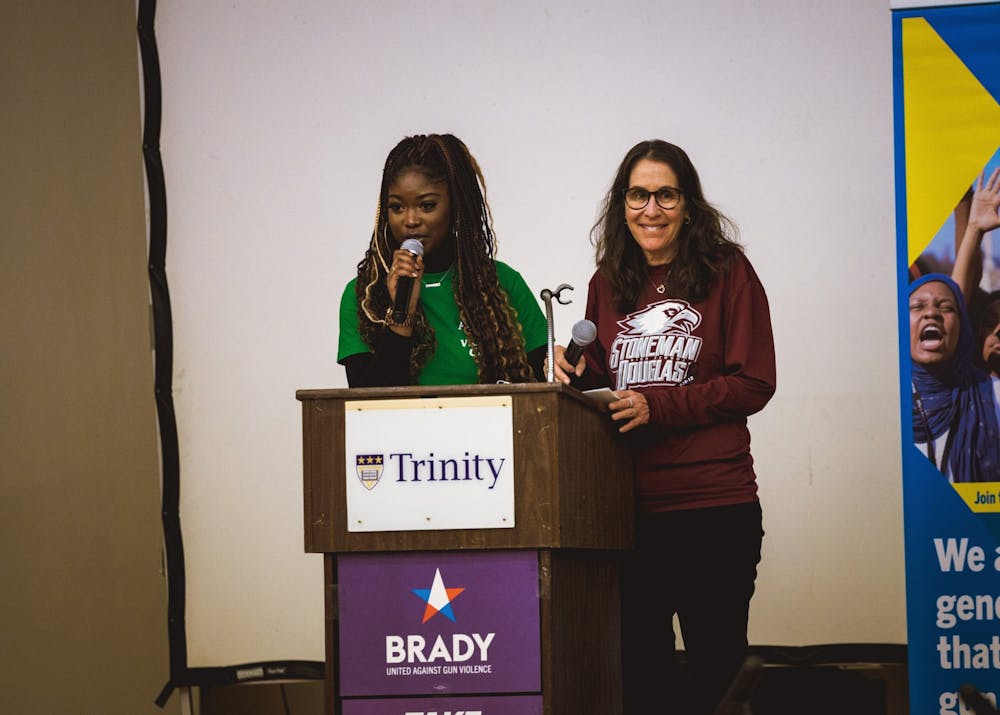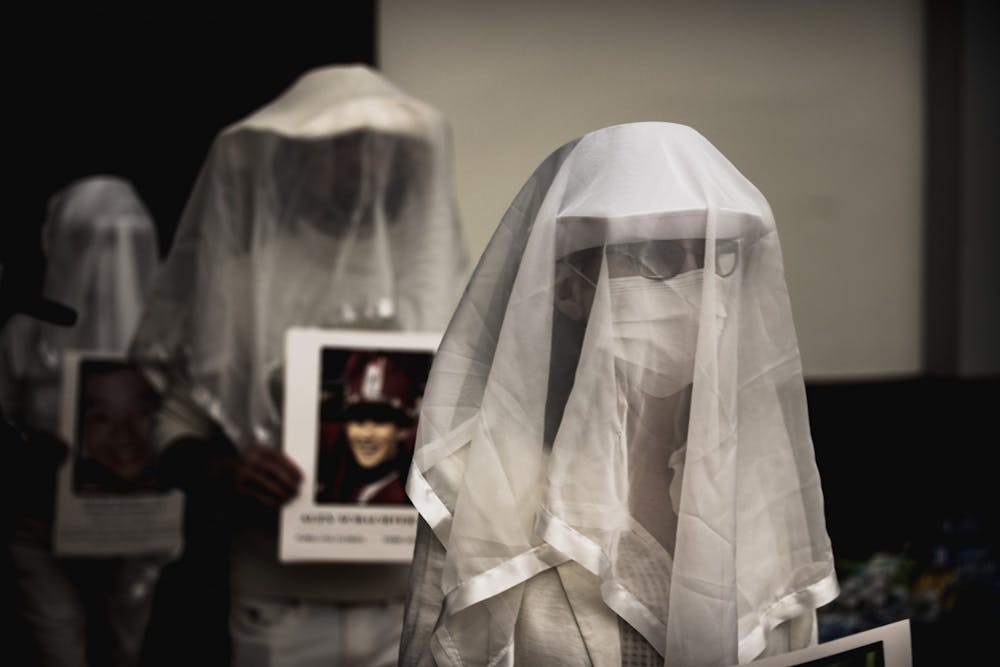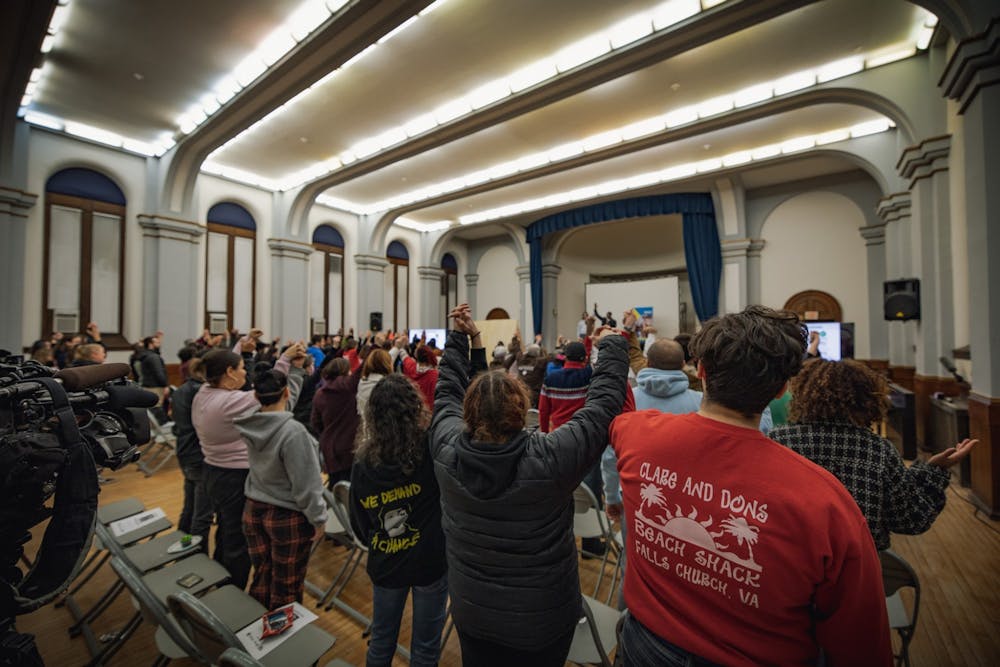Five years have passed since 17 students and staff were killed in a shooting at Marjory Stoneman Douglas High School in Parkland, Florida.
To mark the anniversary, a commemoration and vigil was held on Feb. 14 at Trinity Washington University in D.C. to bring together survivors of gun violence, victims’ family members, lawmakers, activists and concerned citizens, from both Parkland and beyond. The event was hosted by Brady United, a national gun violence prevention organization, along with their youth program Team ENOUGH. It was co-sponsored by March for Our Lives and Change the Ref.
The event was held in the O’Connor Auditorium, complete with a string quartet and an art installation. Speakers included survivors of the Parkland shooting, students at Trinity Washington University and other gun violence prevention activists.
Aalayah Eastmond is an advocate for gun violence prevention, social justice and racial equity and a survivor of the Parkland shooting. She is the national administrator for Team ENOUGH. She also helped found Concerned Citizens D.C., an organization dedicated to improving the quality of life for Black people in the district.
Eastmond helped organize and spoke at the event about her experience with the Parkland shooting.
“We will never be the same after experiencing what we did. I was an eyewitness to the death and destruction of gun violence,” she said.
“We share our stories because we must. We stand on the shoulders of advocates and survivors who have been fighting for a peaceful and safe world long before us. And we will be sure to continue this fight,” Eastmond continued.

Parkland survivors Aalayah Eastmond (left) and Ivy Schamis (right) speak at the event.
Antonio Osso, a freshman in the School of Public Affairs and the treasurer of American University’s March For Our Lives chapter, watched a livestream of the event and said it “felt very humble, very respectful, but at the same time very empowered.”
Robert Schentrup, the emcee of the vigil and a gun violence prevention activist whose sister, Carmen Schentrup, was killed during the Parkland shooting, expressed his worry that many people are starting to consider tragedies like this to be normal, citing a “fatalist mentality” and a “defeatist attitude.”
“Instead of becoming activated in the fight,” Schentrup said in an interview with The Eagle, young people have “started resigning themselves to gun violence being part of their lives.”
In 2018, roughly 40,000 people were killed due to gun violence in the U.S. In 2021, the number rose to approximately 48,000.
“We really saw this uptick in gun violence because of a lack of a national response,” Schentrup said.
Schentrup emphasized that the solutions to gun violence exist and that other industrialized nations do not have this problem. He called it a “uniquely American problem.”
Schentrup called for politicians’ help in championing gun control legislation and getting more lawmakers on board.
“The biggest issue we have right now is political will to implement those solutions,” he said.
What has changed since Parkland?
Following Parkland in 2018, nationwide protests broke out lobbying for gun control and other changes in legislation. From this sparked the youth-led gun violence prevention organization March for Our Lives, spearheaded by Parkland survivors.
The Parkland gunman was sentenced to life in prison without the possibility of parole in October 2022, following an emotional trial where many survivors and family members of victims spoke.
There have been some changes in gun legislation at the state level, such as the Marjory Stoneman Douglas High School Public Safety Act in Florida. The law was passed in March 2018 and raised the legal age to buy firearms to 21 and added heightened security in schools.
Schentrup testified in court to help pass legislation to ban high-capacity magazines in Washington state in 2022. He also testified in Colorado in 2019 to implement Extreme Risk Protection Orders, also known as red flag laws, which allow guns to be temporarily restricted to individuals who are believed to be a danger to themselves and others. Nineteen states, plus D.C., currently have ERPO laws.
However, mass shootings, both at schools and other places, continue to occur. Last May, 21 students and staff were killed at Robb Elementary School in Uvalde, Texas. In January 2023, 11 people were shot to death in Monterey Park, California, at a dance studio. Two days later, seven more lives were taken by gun violence in Half Moon Bay, California.
A shooting at Michigan State University left three students dead on Feb. 13, the day before the fifth anniversary of Parkland.
In his State of the Union address this month, President Joe Biden pledged to fight to “ban assault weapons once and for all.”
Ivy Schamis, a former Marjory Stoneman Douglas teacher and a survivor of the Parkland shooting, wants further action from lawmakers.
“What will it take to ban assault rifles, to enact red flag laws in every state, to do extensive background checks, to raise the legal age to purchase firearms?” she said at the vigil on Feb. 14. “If most Americans agree that gun violence is a big problem in the United States, why can’t we pass laws to keep our citizens safe?”

A demonstration including photos of the victims of the Parkland shooting.
Gun violence in D.C.
Gun violence in D.C. has been a pressing issue in recent years, as homicides have risen gradually since 2017, according to the National Institute for Criminal Justice Reform.
But numerous organizations in the district are fighting against this issue.
Selina Mathis, a native Washingtonian and student at Trinity Washington spoke at the memorial about the work she does with the T.R.I.G.G.E.R. Project D.C., an organization that works on “preventing interpersonal gun violence through the intersection of youth development and public health,” according to its website.
T.R.I.G.G.E.R. Project D.C. emphasizes the ways that communities of color are disproportionately impacted by gun violence.
“Both our nation and our community have accepted gun violence in communities of color as the standard way of life,” the project’s mission statement says. “We focus on changing the norm and narrative of gun violence in communities of color.”
“I can remember a time in this city where we weren’t plagued by gun violence,” Mathis said. “But things have changed a lot since then, to the point where the people in our community have learned to adapt to this abnormal way of living.”
Mathis highlighted how the T.R.I.G.G.E.R Project sees gun violence as a disease and a “true public health issue that spreads through model behavior.”
“We must come together as one. Hold law enforcement accountable for response times, address gun advocates and hold them accountable on how to properly protect and educate,” Mathis continued.
March for Our Lives Chapter at American University
At AU, the March for Our Lives chapter is returning after a year of hiatus. Members of the organization attended the vigil at Trinity Washington.
Osso, the chapter’s treasurer, supports the idea of the organization being youth-driven and more open to younger perspectives and said that’s what drew him to join.
He said that in high school, he would think of where to hide in every classroom in the case of a school shooting.
Osso reiterated Schentrup’s concern of mass shootings becoming normalized.
“Things that are considered tragedies are all the more becoming the norm and a lot of people are not learning to live against it, but rather live with it, especially adults,” he said.
The chapter is currently waiting on official recognition and funding from the Center for Student Involvement, which will not happen until the fall 2023 semester.
For now, they are mostly focused on logistics and recruitment, as well as hosting events that are possible with a limited budget.
Additionally, the club plans to be in close communication with other local college chapters, such as the chapters at George Washington University and Georgetown University.
“We’re definitely not going to be silent these next few months,” Osso said. “That much is for sure.”
This article was edited by Gabe Castro-Root, Jordan Young and Nina Heller. Copy editing done by Isabelle Kravis, Sarah Clayton, Stella Guzik and Leta Lattin.





